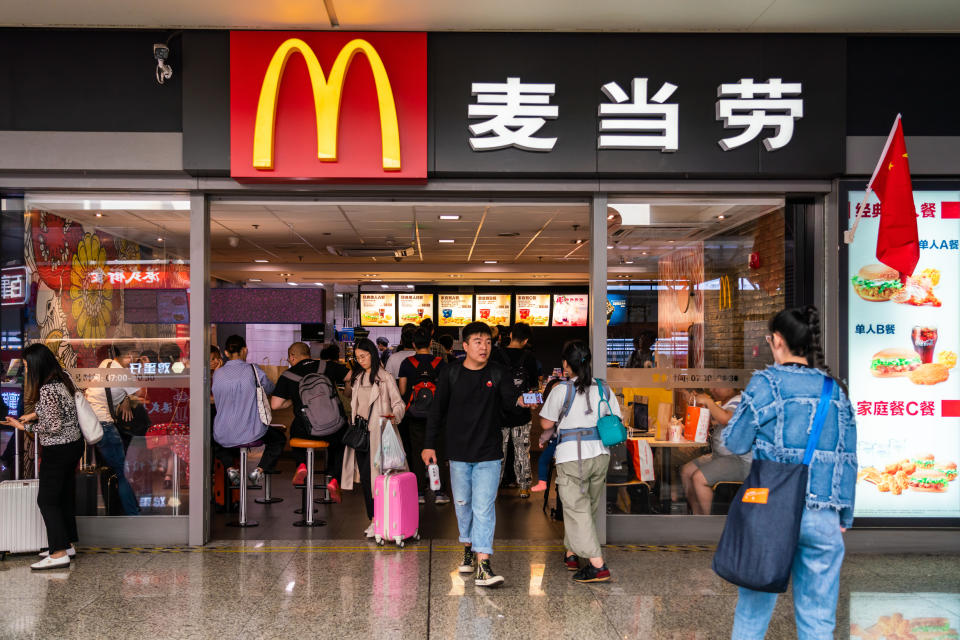Coronavirus: The most vulnerable restaurant companies, according to analyst
Companies around the world have been working furiously to deal with the fallout from the deadly coronavirus. But there are some multinational companies that are feeling the pain more than others, according to an analyst.
“Starbucks [is] probably the most exposed, followed maybe by Yum Brands and then McDonald's,” BTIG senior restaurant analyst Peter Saleh said Thursday on Yahoo Finance’s On The Move.
And the damage could really hit hard, Saleh argued. “It's really the larger global operators. But all in all, it will be, a low- to mid-single digit hit to operating profit for any of these guys, assuming, there is a solution and business gets back on track sometime over the next couple of quarters.”
Consumer-facing multinational companies like Starbucks (SBUX), Yum Brands (YUM) and McDonald’s (MCD) have had to temporarily close their doors in China, as health officials around the world attempt to contain and mitigate damage of the coronavirus.
Last week, Starbucks announced that it closed half of its 4,100 stores in China. “You know, they own a majority of their stores in that country. They closed about 2,100 stores. That will have an impact on their profit,” Saleh said.
China is Starbucks’ second-largest market and its fastest growing. “As events unfold, we will be transparent with all stakeholders in communicating how we are responding to these extraordinary circumstances and the implications for our near-term business results,” CEO Kevin Johnson said in a statement.

McDonald’s announced that as of Jan. 24, the company temporarily closed stores in Wuhan and the surrounding cities. The fast food giant’s management said on the company’s earnings conference call Jan. 29 that several hundred stores were closed in China but 3,000 stores remain open. “China for us is a critical strategic market but it is 9% of global restaurant count, 4%-5% of systemwide sales. Actual impact on business is going to be fairly small, assuming it stays contained in China.”
Yum Brands CEO David Gibbs said Thursday on the company’s earnings call that the coronavirus would be a headwind for the company in 2020. As of the fourth quarter, China is the largest market for KFC and represents 27% of sales. Meanwhile, China is Pizza Hut’s second-largest market behind the U.S. and accounts for 17% of sales.
Yum China which was spun off from Yum Brands in 2016, said Wednesday evening that it had closed more than 30% of its nearly 9,000 stores in China in response to the epidemic.
Yum China CEO Joey Wat said Wednesday evening “looking ahead, while it is difficult to fully ascertain the expected impact of the coronavirus outbreak at this time, we can reasonably expect it to materially affect our 2020 sales and profits.”
Since the outbreak, Yum China closed stores on Jan 24 in the Hubei Province, and now more than 30% of its stores are temporarily closed. “For restaurants that remain open, same-store sales since the Chinese New Year holiday period were down 40-50% compared to the comparable Chinese New Year holiday period in 2019, due to shortened operating hours, reduced traffic and other factors related to the outbreak.”
There is currently no estimate for when stores can reopen and when the traffic will be restored, according to the company.
Saleh explained that the impact of the coronavirus on Yum’s business would be on the company’s operating profit. “The way the math works is right now, essentially a 10% decline in the China sales would equal a slightly more than a 1% decline in Yum's operating profit. So depending on how long this goes on, you could see, several basis points of weakness in their operating profit. It's a franchise business model. They don't get the top line as much as they get a little bit on the operating profit. I guess it's a good thing that they've sold or spun out that business several years back.”
—
Heidi Chung is a reporter at Yahoo Finance. Follow her on Twitter: @heidi_chung.
More from Heidi:
Taco Bell parent Yum Brands earnings miss expectations, dragged by Pizza Hut
Facebook's stock tanked after earnings — analysts weigh in on why
Find live stock market quotes and the latest business and finance news
Follow Yahoo Finance on Twitter, Facebook, Instagram, Flipboard, LinkedIn, and reddit.


